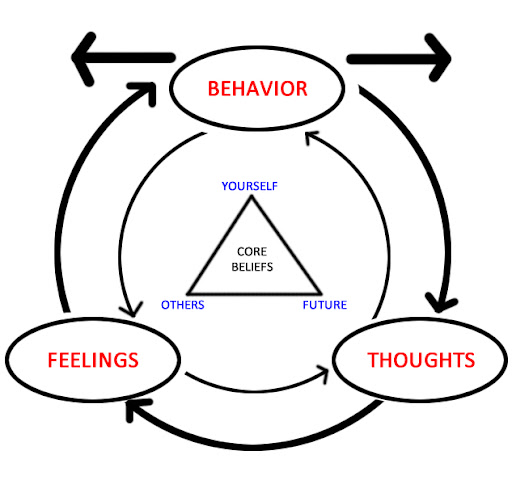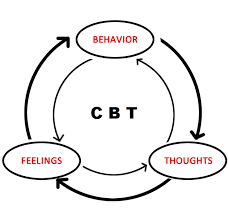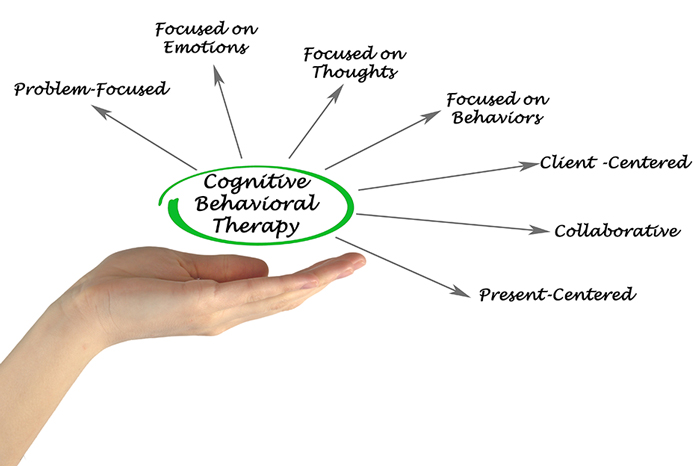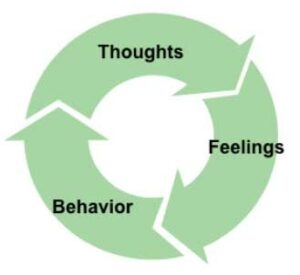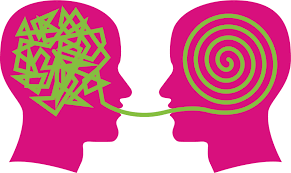Cognitive Behavioral Therapy is a type of therapy that helps people change their thoughts and behaviors. The therapy is very helpful to treat many different mental health conditions, including depression, anxiety disorders, bipolar disorder, eating disorders, and more. In this blog post, we will discuss what Cognitive Behavioral Therapy is all about.
Contents
- 1 What Is Cognitive Behavior Therapy?
- 1.1 Types Of Cognitive Behavior Therapy
- 1.2 How Do Cognitive Therapy Sessions Work?
- 1.3 Benefits Of Cognitive Behavior Therapy
- 1.4 What Is The Evidence That CBT Works?
- 1.5 Difference Between Cognitive Behavior Therapy And Psychodynamic Therapy
- 1.6 How Does Cognitive Behavior Therapy Help?
- 1.7 Who Can Use Cognitive Behavior Therapy?
- 1.8 Techniques Of Cognitive Behavior Therapy
- 1.9 Drawbacks Of Cognitive Behavior Therapy
- 2 Conclusion
What Is Cognitive Behavior Therapy?
Cognitive-behavioral therapy or CBT for short is a type of psychotherapy that explores the relationship between one’s thoughts, feelings, and behaviors. It has been shown to be effective in treating issues such as depression, anxiety disorders, eating disorders, and stress management.
This approach helps people shift their way of thinking about themselves, which can lead to changes in behavior patterns. Cognitive-behavioral therapy is a type of therapy that changes how people think. The techniques are based on learning theories developed by an American psychologist, Joseph Wolpe. He believed it was possible to change how individuals think through practice via exposure therapies.
Types Of Cognitive Behavior Therapy
There are a few different types of cognitive behavior therapy that can be very helpful, depending on the problem. Such as:
- Behavioral Activation: This type of CBT focuses on helping people who are depressed get back to their normal routine by gradually increasing activities they once enjoyed.
- Interpersonal Therapy (IPT): IPT focuses on resolving interpersonal problems by working to understand the current situation, which may include recent losses or other significant events that might be causing depression or anxiety.
- Cognitive Restructuring: In this approach, people learn how to identify and challenge distorted thoughts that may be contributing to problems like anxiety or depression.
- Exposure and Response Prevention (ERP): This is often used for treating obsessive-compulsive disorder (OCD) and involves exposing individuals to triggers or feared situations in a gradual and controlled manner so they can learn how to cope without resorting to compulsions or rituals.
- Mindfulness-Based Cognitive Therapy: This type of CBT helps people become more aware of their thoughts and feelings in the present moment, without judgment. It is often used to help people manage stress or anxiety.
How Do Cognitive Therapy Sessions Work?
Cognitive Therapy sessions usually work in the following ways:
- Cognitive-behavioral therapy sessions usually involve a therapist asking you questions about your thoughts, feelings, and behaviors.
- They may also ask you to complete worksheets or exercises between sessions.
- The goal is to help you become more aware of the thoughts and emotions that are causing you distress so you can start to address them head-on.
Benefits Of Cognitive Behavior Therapy
There are many benefits to cognitive behavior therapy, such as:
- It is one of the most effective treatments for depression and anxiety disorders.
- It can be done on a short-term basis (usually around 12 weeks) or long-term basis if needed.
- CBT has been shown to help reduce symptoms of OCD, disorder, social phobia, and eating disorders.
- It can be done individually or with a group of people who are also receiving treatment for the same issue.
- CBT has been shown to be as effective for treating issues like depression and anxiety as antidepressant medications.
- It can help people learn how to challenge their own thoughts so they are not held back by fear or other negative emotions.
- If you do not want to take medication, this type of therapy is a good option.
What Is The Evidence That CBT Works?
The evidence that CBT works are many, such as:
- Over the past few decades, many studies have shown that cognitive-behavioral therapy is effective for treating different mental health problems.
- Some people with anxiety and depression who also have borderline personality features get better when they receive cognitive behavior therapy (CBT).
- Another study found that this type of psychotherapy was just as beneficial for people with depression and panic disorders as antidepressants were. Yet another study suggested there may be no difference between the two treatments when it comes to some outcomes like reducing symptoms of OCD. Still, other research has shown similar benefits for interpersonal therapy versus antidepressant medications among women with depression.
- As you can see, the evidence that cognitive-behavioral therapy works is quite strong. If you are considering this type of treatment, be sure to speak with a therapist who can help you find the best approach for your needs.
- Cognitive behavior therapy has been found to be one of the most effective treatments for mental health conditions like depression and anxiety disorders. The techniques involved can be learned easily and applied in everyday life, making it a good option for anyone who does not want to take medication.
- There is strong evidence that CBT works, so if you are considering this type of treatment, be sure to speak with a therapist who can help you find the best approach for your needs.
Difference Between Cognitive Behavior Therapy And Psychodynamic Therapy
These two approaches to therapy may seem similar because they both focus on how thoughts and feelings influence behavior, but there is one main difference.
- In psychodynamic therapy, people talk about their thoughts. They ask questions and find out what they really feel. Then they can make a plan for what to do next.
- In cognitive-behavioral therapy, therapists help people think about thoughts and feelings in the present moment. They do not focus on thoughts and dreams from the past.
- Cognitive-behavioral therapy helps people change the way they think, feel and behave in the present. Psychodynamic is about exploring thoughts and feelings from the past.
- CBT is a very effective treatment for a variety of mental health conditions, while psychodynamic therapy is more helpful for treating depression. A therapist can provide support and guidance as you work through CBT techniques.
How Does Cognitive Behavior Therapy Help?
CBT helps people change the way they think, feel, and behave. The goal is to help people become more aware of how their thoughts and feelings influence their behavior. This type of therapy can be helpful for anyone who wants to learn how to manage their mental health problems on their own.
When someone is feeling down or anxious, it can be tough to break out of those negative cycles on your own. A therapist can provide support and guidance as you work through CBT techniques. They can also offer feedback and help you apply what you’re learning in real-world situations.
Who Can Use Cognitive Behavior Therapy?
Anyone can use Cognitive Behavior therapy, such as:
- Cognitive-behavioral therapy is usually for anyone who doesn’t want to rely on medication or use more in-depth psychotherapy techniques.
- However, if you think about violence against yourself or others, then this treatment might not be the best for you.
- Some research shows that CBT may not work as well when treating certain mental health conditions compared to other approaches like counseling.
- Cognitive behavior therapy can help people, but there are some exceptions. If you have thoughts about hurting yourself or someone else, or if you have a personality disorder, CBT might not be a good idea for you.
Techniques Of Cognitive Behavior Therapy
There are several techniques in CBT. But there some of the most common, such as:
- Journaling or keeping a daily diary to track your moods and how you’re feeling throughout the day. This can help people see patterns in their thoughts and feelings. It can be very helpful if something reminds them of something difficult from the past. You might also notice that when you feel angry, your self-esteem will go down. Then it is more likely that you will feel angry again. This insight could help someone who gets nervous when they have to do something in public. They might be able to practice this before and then it will not be as hard when it actually happens.
- Identifying your “cognitive distortions,” or thoughts that are unrealistic, judgmental, and/or negative. When you are aware of what you are thinking, you can change your thoughts so they don’t bother you. It means that you recognize when you are not doing the right thing. It is like saying “I know what I did was not good.” You can replace your bad act with a good one instead.
- Exercising regularly. Studies have shown that people who are physically active tend to have better mental health overall. Regular exercise can make you feel better. It can help to lower stress levels and develop feelings of self-efficacy.
Drawbacks Of Cognitive Behavior Therapy
Like any type of treatment, cognitive-behavioral therapy isn’t perfect for everyone. There are some potential drawbacks, such as:
- The time commitment. CBT usually involves meeting with a therapist for around an hour each week for a number of months. This can be difficult to fit into a busy schedule.
- Therapist availability. Not all therapists offer CBT and there may be long waitlists in some areas.
- The cost. Sessions with a therapist can be expensive, depending on your insurance coverage.
- Cognitive behavior therapy is not perfect for everyone and has some possible drawbacks including time commitment, therapist availability, and cost. However, it is one of the most helpful forms of therapy with great results.
Conclusion
CBT is a type of therapy that is very helpful and scientifically proven to help people with feelings of depression and anxiety. It is a way for you to feel better. CBT helps people identify their bad thoughts about themselves and the world. It also helps them to find better thoughts that are more true. We can learn how to overcome our problems by doing the exercises. As we do not need medication alone.
If you are looking for affordable Online Counseling MantraCare can help: Book a trial therapy session
